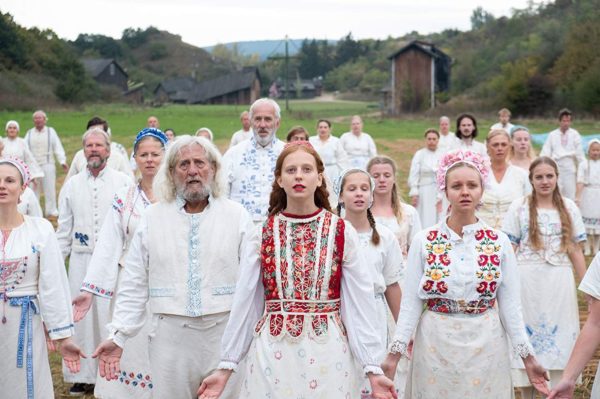Film Review: “Midsommar” — A Feminist Grimoire
By Peg Aloi
People versed in modern witchcraft or paganism may recognize some of the themes examined in Midsommar, but what I found most fascinating was the pronounced emphasis on female sexuality.
Midsommar, directed and written by Ari Aster. Screening at AMC Boston Common 19, AMC Assembly Row, and Regal Cinemas Fenway.

A scene from “Midsommar”
Garlanded with bright flowers and lush scenes of nature, not to mention festooned with smiling white people garbed in linen frocks, Ari Aster’s Midsommar often looks like a trippy pagan festival. But, at its heart, the film asserts some deep, ancient matriarchal wisdom. Dani (the excellent Florence Pugh) is coping with the sudden and heartbreaking loss of her sister and parents. Her boyfriend Christian (Strange Angel’s Jack Reynor), self-centered anthropology scholar, is invited (along with a couple of his pals), unbeknownst to Dani, to a cultural festival in Sweden for a month. Dani is hurt that she was left out and, even though their relationship is rocky, he asks Dani to come along at the last minute.
Handsome grad students Christian and his friends Josh (William Jackson Harper of The Good Place) and Mark (Bandersnatch’s Will Poulter) are besotted with the gorgeous Swedish women, which creates yet another source of tension between Dani and Christian. But Pelle (Wilhelm Blomgren), their classmate and Swedish guide/host on the trip, does his best to comfort Dani. Despite her lack of anthropological chops, Dani’s far less awkward than her male companions once they arrive at the remote Swedish enclave. Two students from London are there, also brought by a member of the community, Pelle’s “brother” (they’re all related somehow), the ingratiating Ingemar (Hampus Hallberg). The guys immediately are up for taking hallucinogenic mushrooms; Dani feels pressured to go along. The results are rather hilarious (English actor Poulter is spot on as a clueless American). But Dani, despite some frightening visions, is instantly at ease with the natural surroundings. Even when the initial ceremonies prove to be upsetting to the point of trauma (to put it mildly) Dani, with the help of various psychotropic herbs and the kindness of her friendly Swedish hosts, begins to feel connected to the weird pagan vibe, including the unusual rituals taking place. Mealtimes are solemn and formal; everything takes place outdoors in the endless Scandinavian summer sunshine.
Josh is working on a thesis about European midsummer ceremonies, and asks a few too many invasive questions of his hosts, but they eventually relent and let him in on some secrets. I found the emphasis on academia to be a bit tedious at times, a somewhat contrived reason to put these people in this place, and remained unconvinced that these three naïve potheads were actually serious PhD candidates. Christian and Mark are flattered when two attractive Swedish earth maidens seem to be flirting with them. Little do they know that, in this community, women have the upper hand; and men from outside the community are needed to offset the dangers of inbreeding. One willowy redhead, Maja, has her eye on Christian. Via close-ups of painted banners depicting love charms made with pubic hair and menstrual blood, we eventually figure out what she’s doing to ensnare him. Meanwhile, Dani is cajoled into participating in an exhausting ritual dance after which she is crowned (literally, with heaps of flowers) May Queen: a distinctive honor she doesn’t quite understand.
The portrayal of these rites is dizzyingly intense at times; no doubt some viewers will be moved to nervous laughter (as happened at the press screening I attended). But others may be mesmerized by the strangeness, the sense we are witnessing something we shouldn’t. Aster’s Hereditary was masterful in slowly revealing the horrific hidden world of its protagonists; in Midsommar, we’re given clues much sooner, but are perhaps reluctant to accept their implications, seduced as we are by the colorful, sensual visuals and pastoral music. Dani proves to be the most significant character here — she alone will be given a key to the mystery.
This community also has some unorthodox but fascinating notions about aging and death. There’s a hint of Logan’s Run redux, albeit grounded in an ancient, as opposed to futuristic, consciousness. People versed in modern witchcraft or paganism may recognize some of the themes examined here, but what I found most fascinating was the pronounced emphasis on female sexuality, a potent force in this community (okay, lots of people will want to call it a cult). Using men exclusively as fertility aids, to be cast aside once they’ve served their immediate purpose, is provocative (to say the least), especially in our current cultural zeitgeist, where women’s bodily autonomy is being challenged in terrifying ways.
Midsommar brazenly explores a vision in which life’s passages of birth, puberty, pregnancy, aging, and death are seen as an elemental part of nature’s cycles — any other interpretation is the result of centuries of social conditioning. If people embraced the natural order, no questions asked, we’d all, perhaps, be as happy and healthy as these smiling Scandinavians. And this wouldn’t be a horror film. But horrific it is. And also thrillingly weird and beautiful.
Peg Aloi is a former film critic for The Boston Phoenix. She taught film studies in Boston for over a decade. She writes regularly for The Orlando Weekly, Crooked Marquee, and Bloody Disgusting. Her blog “The Witching Hour” can be found at at themediawitch.com.


Loved it!
You almost had me until your naive conclusion suggesting a nostalgia for an imagined (white) feminist past. As if, somehow, we’re to assume that the same community that underwrites practices like the perverse taxidermy performed on Simon, one of the two persons of color, handiwork that would have made even Silence of the Lamb’s Buffalo Bill blush with envy, can be excused on the basis of their belonging to an originary, unconditioned natural order.